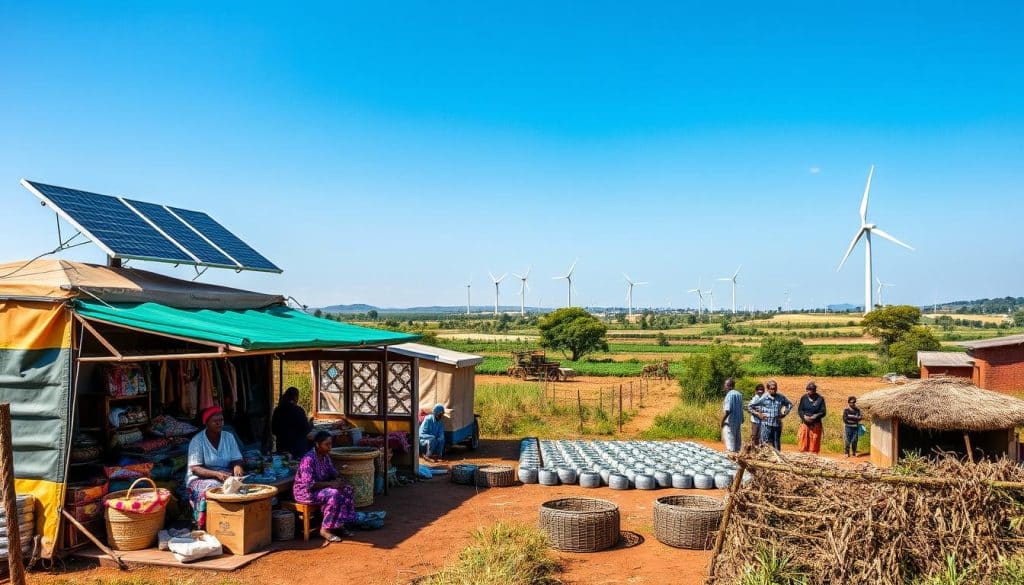In rural Africa, new business ideas are key to boosting the economy and helping communities. They offer a chance to change local economies for the better. By creating these ventures, rural areas can grow stronger and more resilient.
This article will explore the chances for sustainable growth and development. It will show why innovation is crucial for progress in rural Africa.
The Importance of Innovative Business Ideas in Rural Africa
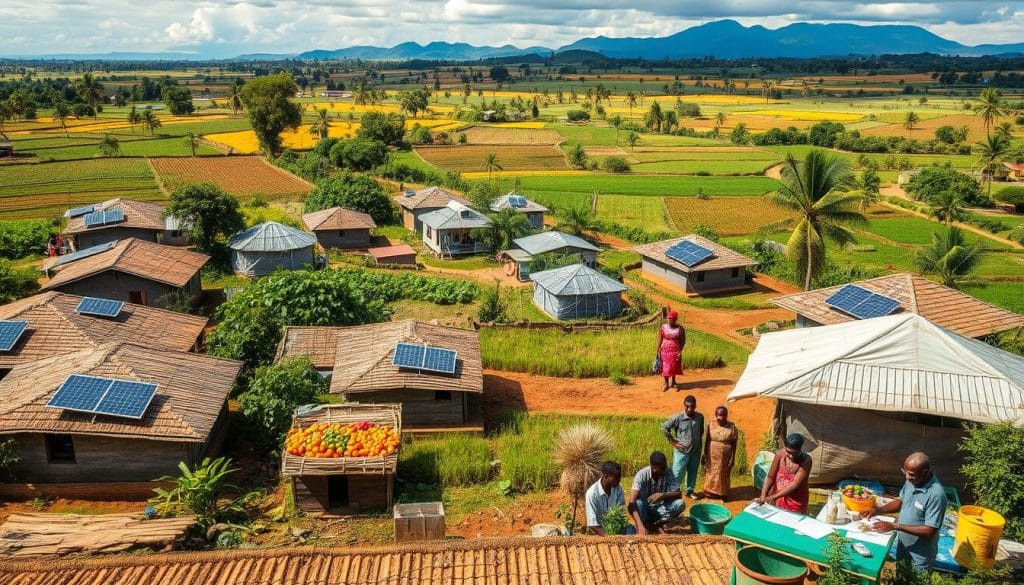
Innovative business ideas are key to unlocking rural Africa’s economic potential. They tackle big challenges like unemployment and limited market access. This is crucial for rural development.
These ideas help create jobs and reduce poverty, improving life quality. They also help meet national economic goals. Studies show innovation is essential for solving rural issues.
- Fostering entrepreneurship encourages local talent and expertise.
- Sustainable practices lead to long-term environmental and economic benefits.
- Community engagement fosters a sense of ownership and responsibility towards initiatives.
By promoting innovative business strategies, rural areas can unlock their economic potential. This paves the way for a brighter future.
Leveraging Agriculture as a Foundation for Economic Growth
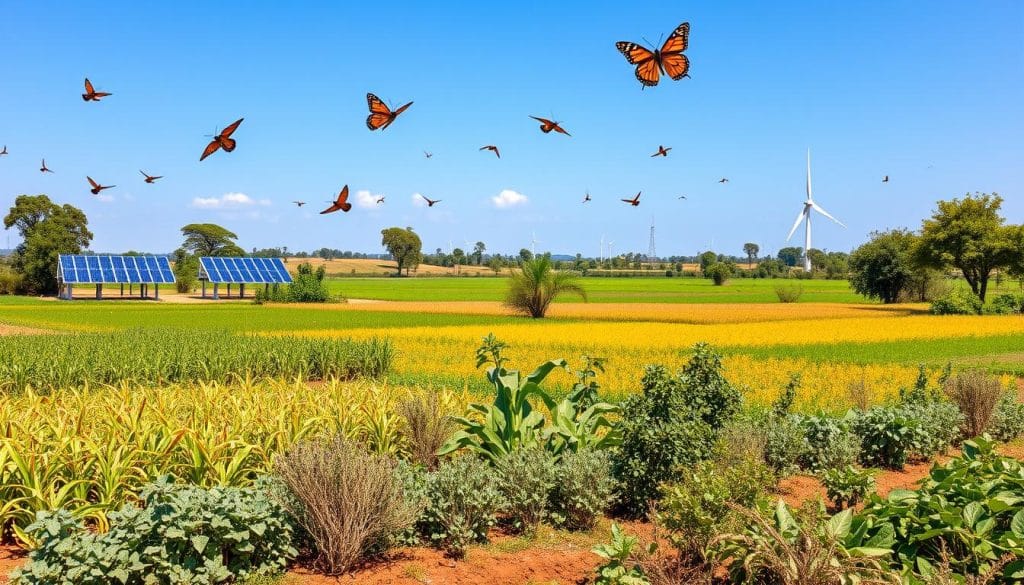
Agriculture is key to the growth of rural economies in Africa. It plays a big role in boosting economic growth. By using new farming methods, we can make farming better and more sustainable. This helps both communities and the environment.
Let’s look at how agro-tech can make farming more efficient. Also, we’ll see how organic farming can be a sustainable business model.
Agro-Tech Initiatives Transforming Farming
Agro-tech is changing farming in Africa. It uses technology to make farming better. Here are some key projects:
- Use of precision farming technology which optimises inputs and maximises yields.
- Development of mobile applications that provide farmers with weather forecasts and market prices.
- Implementation of drone technology for monitoring crop health and managing resources effectively.
These tech innovations boost productivity. They also help make farming more sustainable. This fits with global efforts to be more sustainable.
Organic Farming: A Sustainable Approach
Organic farming is becoming popular for local and international markets. It appeals to people who care about health and the environment. This farming method avoids harmful chemicals, which is good for biodiversity and soil health.
Organic farming has many benefits:
- Reduction of chemical runoff, contributing to healthier ecosystems.
- Higher market prices for organic products, increasing farmers’ profitability.
- Enhanced brand reputation among consumers seeking sustainable and ethically produced food.
Studies show organic farming helps local economies and the environment. It supports rural livelihoods and helps achieve economic growth through sustainability.
Innovative Business Ideas for Rural Areas in Africa
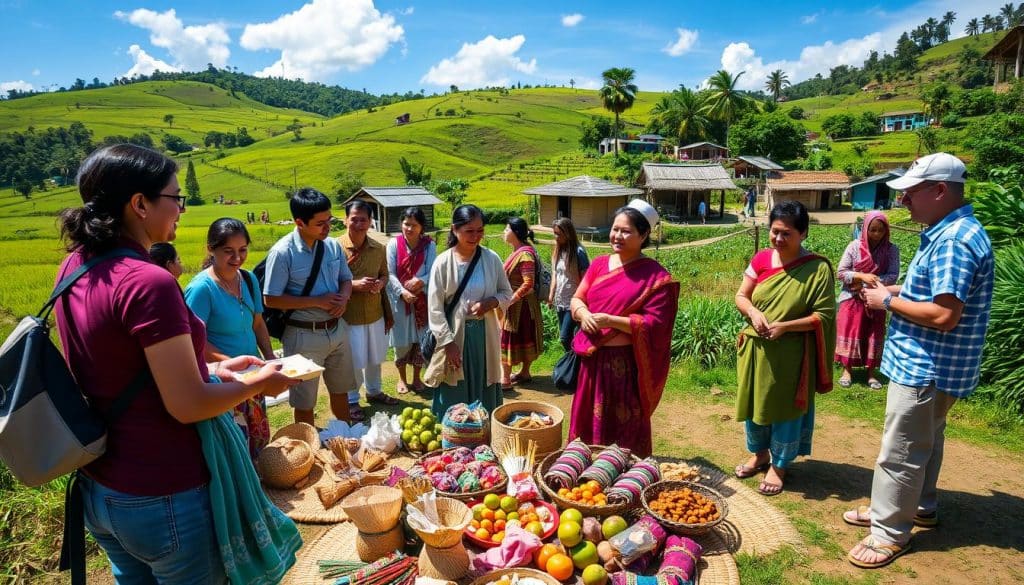
Rural areas in Africa are full of opportunities for new business ideas. These ideas use local cultures and resources. Community-based tourism and artisan crafts are key areas. They help generate income and keep cultural heritage alive.
Community-Based Tourism Opportunities
Community-based tourism helps grow the economy in rural areas. It lets visitors experience local cultures and traditions. This way, the benefits of tourism go straight to the community.
It creates jobs in hospitality and guiding. It also improves local infrastructure for tourism. And it promotes cultural exchange, enriching both visitors and locals.
This approach boosts income, helping communities thrive. It also lets tourists see Africa’s rich cultural heritage.
Artisan and Craft Production as Income Sources
Artisan crafts are crucial for economic stability in rural areas. They provide income for many families. Artisans use traditional skills to make unique products.
These products appeal to both locals and international buyers. Key points include:
- Using local materials and ethical production.
- Supporting skill development and creativity.
- Preserving traditional art forms and community identity.
Local markets and online platforms help artisans reach more people. This increases their income potential. It also improves the socio-economic status of rural communities.
Harnessing Technology for Rural Development

Technology is changing rural areas for the better. Mobile banking and e-commerce are making a big difference. They help people in rural areas connect to more markets and improve their finances.
The Rise of Mobile Banking Solutions
Mobile banking is a game-changer for rural areas. It lets people manage their money on their phones. This makes banking easier and more accessible.
- Increased financial inclusion for underserved populations
- Improved savings behaviour through simplified access to accounts
- Easier access to credit, enabling small businesses to flourish
This helps rural communities grow stronger and more stable.
Utilising E-Commerce for Local Products
E-commerce lets rural businesses sell to people all over the world. Online platforms help local markets reach more customers. This boosts sales and visibility.
- Empowering small businesses to reach new customers
- Promoting unique regional offerings, boosting pride and cultural identity
- Stimulating competition, leading to innovative practices and improved product quality
Technology is key to growing e-commerce in rural areas. It helps local products reach more people, driving development.
Renewable Energy Initiatives in Rural Communities
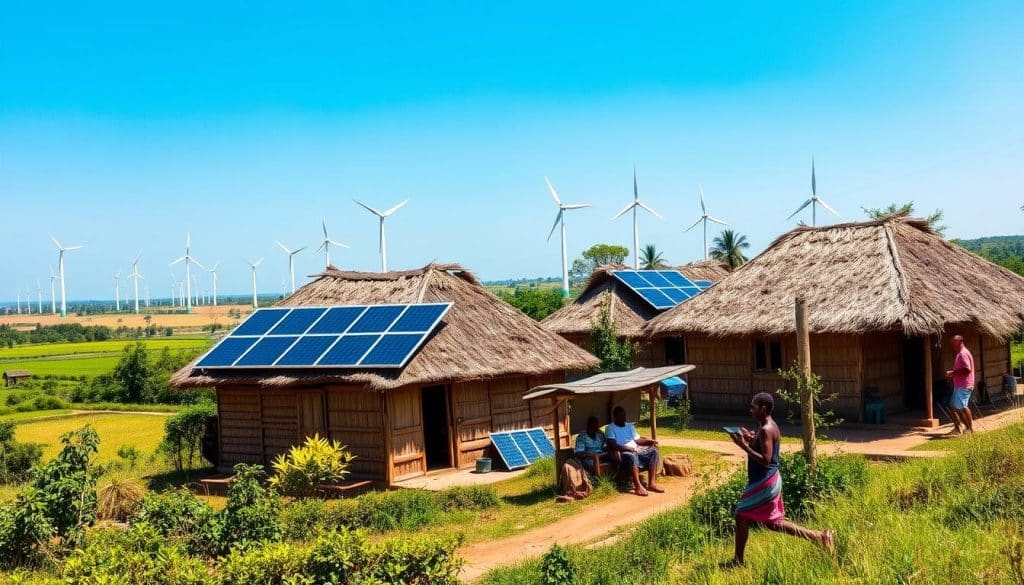
Renewable energy is key to making rural areas more sustainable. It helps solve the problem of limited energy access. Solar, wind, and biogas projects are leading the way.
Solar panels are now common in rural areas. They power homes and farms, making life easier. Wind energy is also growing, offering more energy options.
Biogas turns waste into energy, helping the environment and people. It’s good for cooking and heating. These efforts boost local businesses and jobs.
Renewable energy helps rural areas fight climate change. It makes them more self-sufficient and sustainable. This is good for everyone’s future.
Impact of Education and Skill Development

Education and skill development are key to growing rural Africa’s economy. Training programmes that match local needs empower people. This creates a skilled workforce that boosts local economies.
By focusing on entrepreneurship, these programmes spark innovation and business growth. This leads to better economic stability for everyone.
Training Programmes Tailored for Local Needs
Good training programmes meet the special needs of rural areas. They teach practical skills that fit local industries. This makes people more employable and encourages starting businesses.
Some examples of these programmes are:
- Agricultural practices and sustainable farming techniques
- Business management and financial literacy courses
- Technical training for trades such as carpentry and mechanics
Entrepreneurship Development Initiatives
Programmes that support entrepreneurship are vital. They teach how to start and run a business. They also help find resources and get advice from experts.
Important parts of these initiatives are:
- Workshops on business planning and market analysis
- Networking opportunities with established entrepreneurs
- Support for securing financing and investment
Health and Wellness Enterprises in Rural Africa
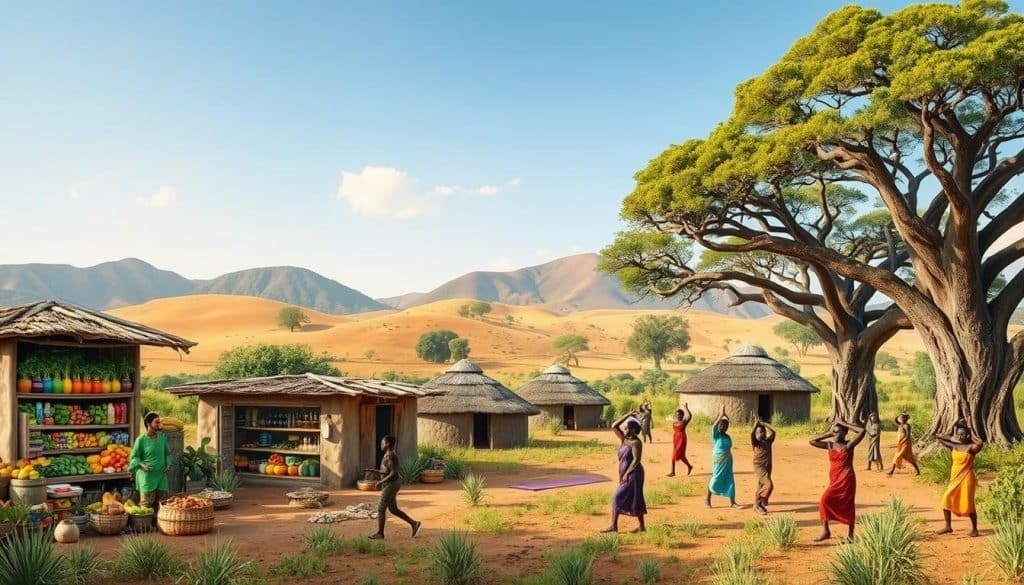
The health sector in rural Africa is changing fast. It’s now key to fixing health gaps and boosting community health. These businesses offer everything from traditional medicine to modern healthcare. They also create jobs for locals, helping their well-being.
Several models show how this field is growing:
- Traditional Health Practices: Rural areas often use local herbalists and healers. They give treatments that fit the culture and really help people’s health.
- Mobile Health Clinics: These clinics go to places that can’t get to doctors. They bring health services to people, helping them stay well and get the care they need.
- Wellness Workshops: Learning is key to staying healthy. Workshops teach about food, mental health, and preventing diseases. They give people the knowledge to live healthier lives.
Health and wellness businesses do more than just help people’s health. They also help the economy grow. When health gets better, communities in rural Africa get stronger. This makes the area more likely to grow and innovate in health and wellness.
The Role of Government Policies in Fostering Innovation
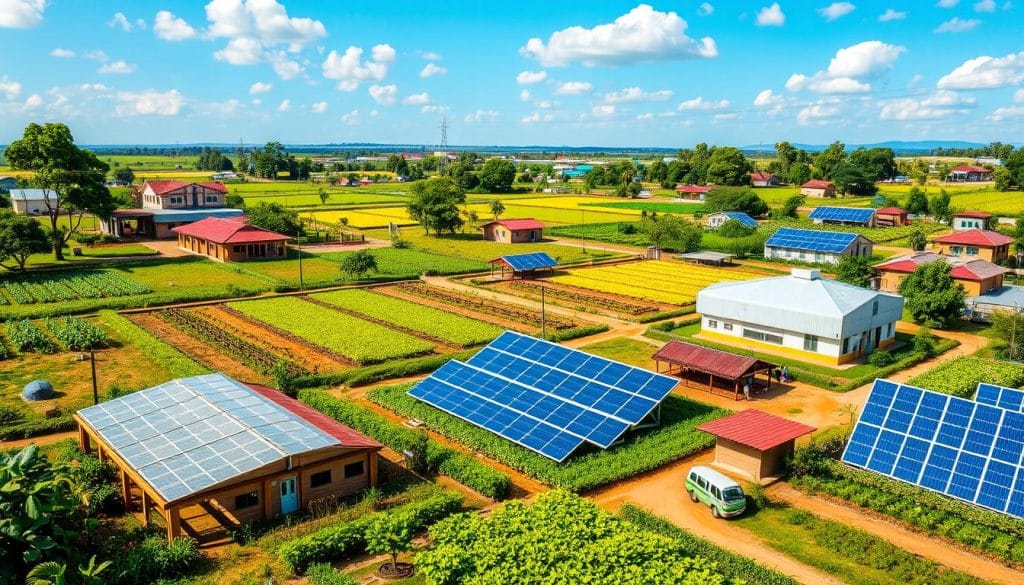
Government policies greatly influence innovation in rural businesses. They create an environment where new ideas can grow. This is done through financial help and supportive rules.
Financial Incentives for Start-Ups
Financial help is key for start-ups. Grants, tax breaks, and low-interest loans ease their financial worries. This lets them take risks and try new things.
Supportive Regulatory Frameworks
A good set of rules is vital for innovation. It helps businesses grow without too much red tape. This lets them focus on their innovations.
Social Enterprises as a Model for Sustainable Growth
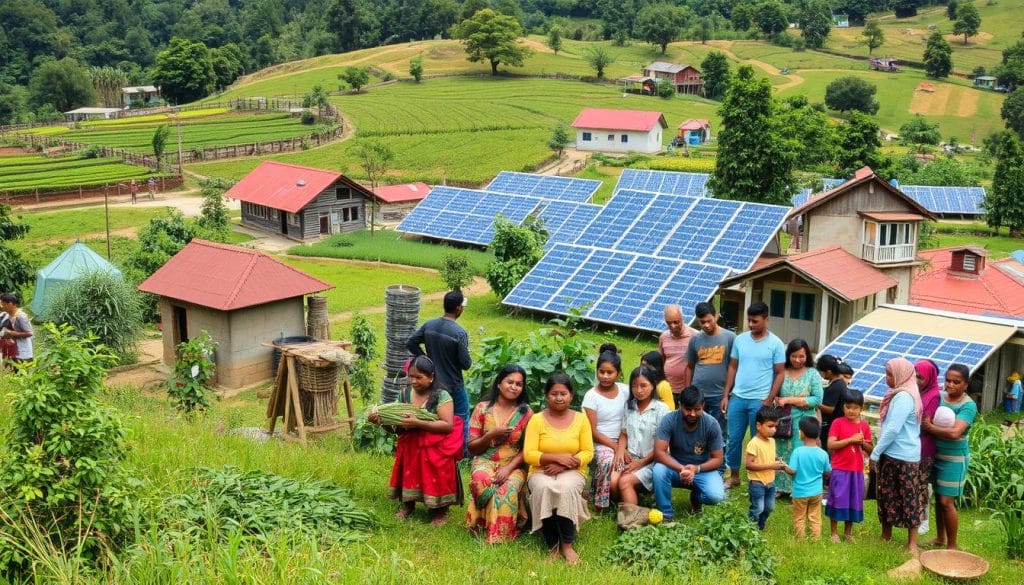
Social enterprises are leading the way in sustainable growth in rural areas. They tackle big social issues and make money, creating a win-win situation. This means they focus on making money and helping the community at the same time.
These businesses put their profits back into the local economy. They work closely with the community to find out what they need. For example, in farming, they offer training to farmers, helping them earn more.
There are many success stories of social enterprises. They create jobs and make important services more affordable. They also focus on the environment, showing how business can be green.
What’s special about social enterprises is how they work together. They team up with governments, charities, and other businesses. This teamwork helps them make a bigger difference in the community. They show that business can be more than just making money, it can be about making a real difference.
Building Infrastructure for Business Success
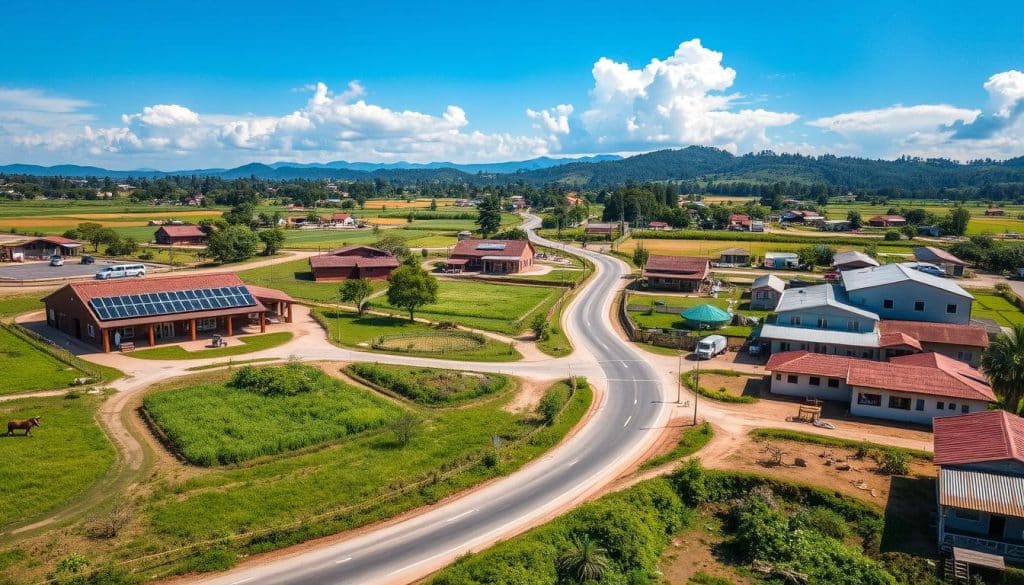
Investing in infrastructure is key for rural business success. Good transport, reliable utilities, and strong communication systems are vital. They help create a place where businesses can grow and reach new markets.
Transportation is crucial. Better roads, bridges, and public transport help move goods and services efficiently. This makes supply chains smoother, cuts costs, and opens up markets for rural businesses.
Utilities are also essential. Stable electricity, water, and internet are needed for businesses to run well. For example, electricity lets local businesses use machines, work longer, and make quality products. Internet helps them sell online, reaching more customers.
Studies show how good infrastructure boosts rural areas. Improvements in these areas have led to more economic activity. This allows small businesses to grow. With the right infrastructure, rural areas can become hubs for new ideas and businesses.
Case Studies of Successful Rural Enterprises
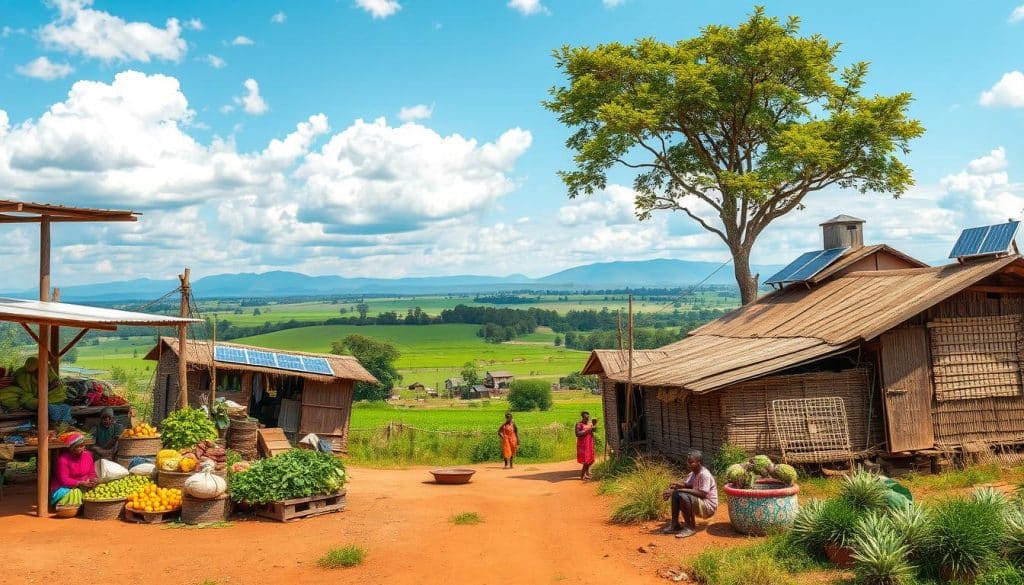
This section looks at inspiring stories of rural businesses in Africa. We see how local heroes have made a big difference in their communities. Their stories teach us valuable lessons for starting our own businesses.
Local Heroes Driving Change
In rural areas, many people have shown great entrepreneurial spirit. They have started projects that have changed lives and helped their communities grow. Their stories show us the hard work and creativity needed to succeed.
- A well-established organic farm that employs innovative permaculture techniques, enhancing food security and promoting environmental sustainability.
- A local craft studio that empowers artisans, enabling them to produce high-quality handmade goods that reflect cultural heritage while generating income.
- A sustainable energy enterprise that provides solar solutions, addressing energy access issues and reducing reliance on non-renewable sources.
Lessons Learned from Their Journeys
The stories of these successful businesses teach us important lessons. Key takeaways include:
- Understanding local needs and integrating community feedback into business strategies is essential for success.
- Building strong networks and partnerships with other local businesses enhances resource sharing and collaboration.
- Adopting innovative technology can streamline operations and reach broader markets effectively.
Challenges Facing Entrepreneurs in Rural Africa
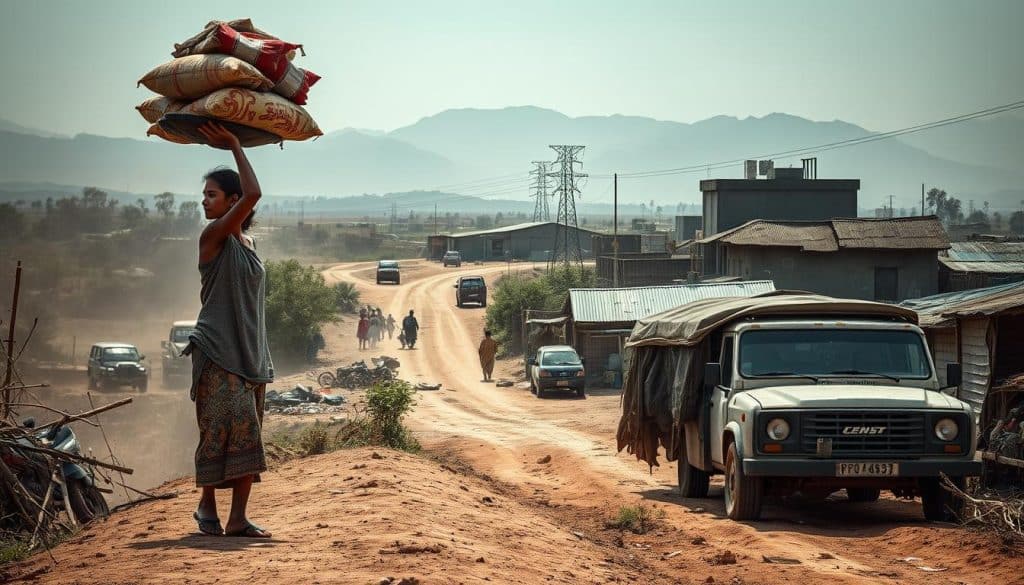
Entrepreneurs in rural Africa face many challenges. One big one is getting money to start and grow their businesses. Banks often don’t lend to small businesses, leaving them without the funds they need.
Bad roads and limited access to basic services make things even harder. This makes getting goods and services to customers expensive and difficult. Also, old ways of doing business can clash with new ideas, making things tough.
Not having mentors is another big problem. Without someone to guide them, entrepreneurs find it hard to succeed. These challenges make it tough for them to bring about change and growth in rural Africa.
Networking and Collaboration Among Rural Businesses
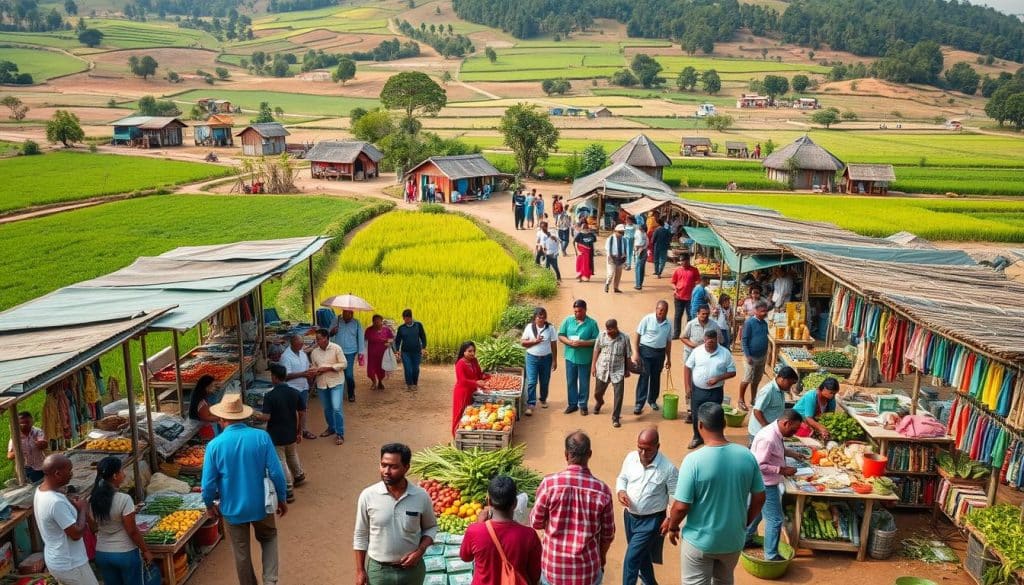
Networking is key for rural businesses to grow. It helps them share resources and knowledge. This makes each business stronger and builds a supportive community.
Creating Cooperative Business Models
Cooperative models are great for rural businesses. They let small businesses work together, gaining strength from each other. This approach offers many benefits:
- More power when dealing with suppliers and clients.
- Shared costs for resources.
- The ability to tackle bigger projects together.
Using cooperative models can make rural businesses more sustainable and help them grow. It’s especially useful in tough economic times.
Fostering Partnerships with Urban Entrepreneurs
Working with urban entrepreneurs can help rural businesses a lot. They can share ideas, resources, and reach new markets. This leads to:
- Access to markets that rural suppliers might not reach.
- Learning new business ideas.
- Working on projects that help the community and create jobs.
These partnerships boost the rural economy. They also give urban entrepreneurs a chance to discover unique rural products and experiences.
The Future of Entrepreneurship in Rural Africa
The world of business in rural Africa is set for a big change. New trends are coming that will change how people make money. With more technology around, entrepreneurs can now use digital tools to create and sell things online.
This change helps local businesses grow. It also lets them work together more, making the business world better for everyone.
People are now wanting more sustainable and local products. This is because more people care about the planet. This trend helps rural businesses grow by meeting these new needs.
It shows that consumers are getting smarter. They want products that are good for the environment. This opens up new business ideas that help the planet and grow the economy in rural areas.
To make the most of these changes, everyone needs to help. Governments, NGOs, and companies should support new ideas and help businesses grow. This will help people start new businesses and make money.
By doing this, rural Africa can achieve its economic dreams. It will unlock a lot of potential that will help communities and the whole continent.

